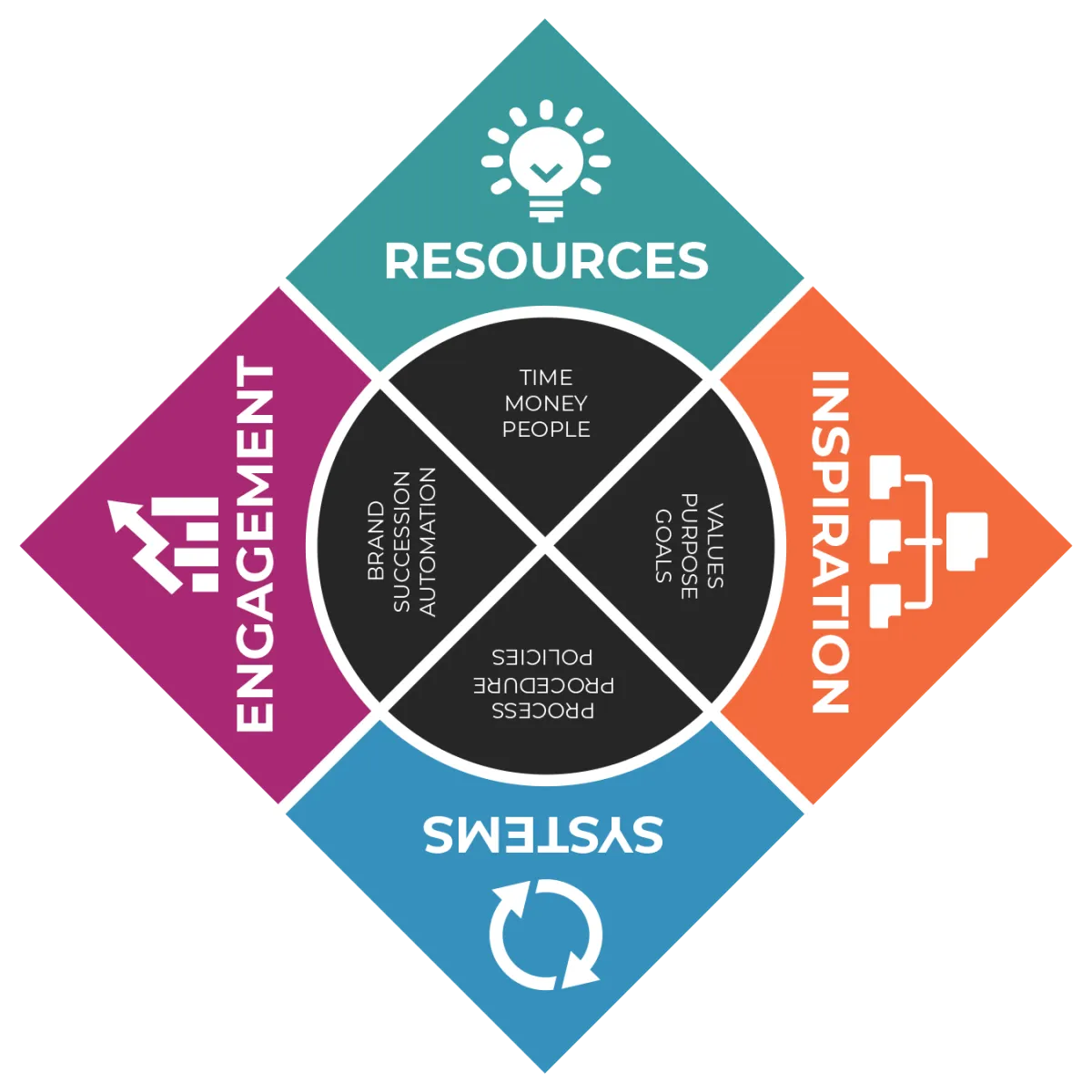
Final Recap & Call to Action – How to Continue Implementing the RISE Framework
Why Implementing the RISE Framework is the Key to Long-Term Success
Building a thriving business requires more than just short-term success—it demands a structured approach to growth, efficiency, and sustainability.
By following the RISE Business Framework, businesses can:
✅ Optimize resources for efficient scaling
✅ Create a clear and inspiring company vision
✅ Implement systems for smooth operations
✅ Develop a marketing and sales strategy that drives results
If you’ve worked through Resources, Inspiration, Systems, and Engagement, you now have a strong foundation—but the real key is consistent implementation.
Recap: The Four Pillars of the RISE Framework
1. Resources – Building a Strong Foundation
✔ Ensured you have the right people, structure, and financial planning.
✔ Developed clear roles, accountability, and growth strategies.
📌 Example: A real estate investment firm optimized its hiring and financial forecasting before scaling its operations.
2. Inspiration – Aligning Your Team & Vision
✔ Created a mission-driven company culture that engages employees.
✔ Defined core values, leadership principles, and long-term goals.
📌 Example: A construction company strengthened its leadership team and vision before expanding to new markets.
3. Systems – Optimizing Operations for Efficiency
✔ Implemented structured meetings, SOPs, and tracking systems.
✔ Automated key business processes to reduce inefficiencies.
📌 Example: A healthcare practice streamlined patient management before opening additional locations.
4. Engagement – Strengthening Sales & Marketing Strategies
✔ Refined branding, messaging, and customer engagement.
✔ Optimized marketing and sales funnels for higher conversions.
📌 Example: An e-commerce brand improved its ad strategy before expanding internationally.
Next Steps: How to Continue Implementing the RISE Framework
Now that you understand the four pillars, it’s time to keep improving and scaling strategically.
Step 1: Conduct a RISE Business Assessment
✔ Evaluate which areas need further optimization.
✔ Identify gaps in resources, inspiration, systems, or engagement.
📌 Example: A tech startup might realize its sales process is inconsistent and focus on refining lead conversion strategies.
Step 2: Create an Ongoing Implementation Plan
✔ Set quarterly goals for each RISE pillar.
✔ Assign team members to oversee improvements in each area.
📌 Example: A coaching business might commit to automating follow-ups and improving client retention over the next quarter.
Step 3: Leverage Expert Guidance & Community Support
✔ Work with business coaches or consultants for guidance.
✔ Join peer groups or mastermind programs for accountability.
📌 Example: A marketing agency might participate in monthly strategic meetings with other business owners to stay on track.
Step 4: Stay Agile & Continue Refining
✔ Review key business metrics and adapt strategies as needed.
✔ Keep improving operations, sales, and marketing for sustainable growth.
📌 Example: A service-based business might track customer retention rates and adjust engagement strategies accordingly.
Frequently Asked Questions (FAQs)
FAQs About Continuing with the RISE Framework
1. How do I know which pillar to focus on next?
✔ Take a RISE Business Assessment to identify weak areas.
2. What’s the biggest mistake businesses make when scaling?
✔ Skipping foundational steps and focusing only on sales growth.
3. How do I track progress in implementing the framework?
✔ Use KPIs, quarterly check-ins, and strategic planning sessions.
FAQs About the RISE Business Framework
1. How does RISE help businesses achieve long-term success?
RISE provides structured growth strategies, performance tracking tools, and expert guidance.
2. Can small businesses use the RISE Framework?
Yes! The framework is scalable for businesses of all sizes.
3. How do I stay accountable in implementing the framework?
✔ Join business coaching programs or peer accountability groups.
Final Call to Action: Take the Next Step in Scaling Your Business
You’ve learned the key pillars of the RISE Framework—now it’s time to put them into action.
✅ Take the RISE Business Assessment to identify growth opportunities.
✅ Set a quarterly roadmap to optimize resources, systems, and engagement.
✅ Stay accountable by working with a mentor or business coach.
🚀 Ready to take your business to the next level? Implement the RISE Framework today!
